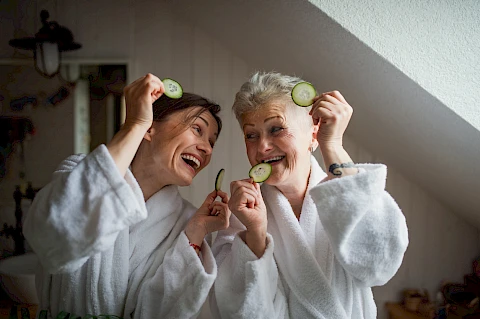
As we age, taking care of our skin becomes increasingly important. Healthy skin boosts confidence, ensures comfort, and prevents potential health issues for older adults. Unfortunately, they may also face an increased risk of common skin problems, including dryness, itching, and increased sensitivity. With this in mind, loved ones can focus on these simple elderly skin care strategies and tips.
Learning About Senior Skin
Aging changes the skin's structure and function, causing it to become thinner, lose fat, and have reduced moisture levels. This results in increased dryness and irritation, with common conditions such as age spots and slower healing of bruises or cuts. Understanding these changes is essential for effective dermatological care.
Preventive Elderly Skin Care Measures
Taking preventative steps is crucial for maintaining radiant skin as we age. Here are some key practices:
- Hydration and Nutrition: Drink plenty of water and maintain a well-balanced diet of vitamins, minerals, and antioxidants from fruits and vegetables.
- Sun Protection: Limit sun exposure by wearing wide-brimmed hats and long sleeves. Use sunscreen with at least SPF 30 to mitigate the effects of ultraviolet rays.
- Regular Dermatologist Visits: Routine check-ups with a dermatologist are essential for monitoring skin changes and detecting potential issues early.
Daily Dermatological Care Routine
Establishing a gentle daily elderly skin care routine can be incredibly beneficial. Use a mild, fragrance-free cleanser with warm water to avoid irritation, and skip scrubbing to protect delicate skin. Apply a rich, fragrance-free moisturizer right after bathing to lock in moisture. Look for hydrating ingredients like glycerin, hyaluronic acid, or ceramides. Choose products designed for sensitive skin, free from dyes and fragrances, and always test new products on a small area first to check for reactions.
Addressing Specific Skin Concerns
To manage dryness and itchiness, use a humidifier during dry seasons and apply soothing lotions or creams. For bruises and minor injuries, clean wounds gently, use antibiotic ointment if needed, cover with a bandage, and apply an ice pack to reduce swelling. Keep skin clean and dry to handle infections and irritations, and consult a healthcare provider if redness or irritation persists to prevent complications. Prompt attention can help avoid more serious problems.
Promoting Comfort and Well-being
Dermatological care goes beyond products; it involves creating a comfortable environment and lifestyle. Keeping a suitable temperature in living spaces is essential, as extreme heat or cold can worsen skin issues. Stress reduction is also key, as it impacts skin health. Activities like reading, listening to music, or gentle yoga can foster relaxation. Additionally, regular physical activity improves blood circulation, positively affecting skin health and overall well-being. Even light exercise can contribute to maintaining vibrant skin and a positive outlook.
Get Help With Elderly Skin Care and Other Daily Needs
A proactive routine is essential for those over 65 to maintain healthy and comfortable skin as they age. Prioritizing dermatological care contributes to overall well-being in later years. For support with daily personal care needs, contact Senior Helpers Lafayette, serving Lafayette, New Iberia, Morgan City, Abbeville, and Jennings.